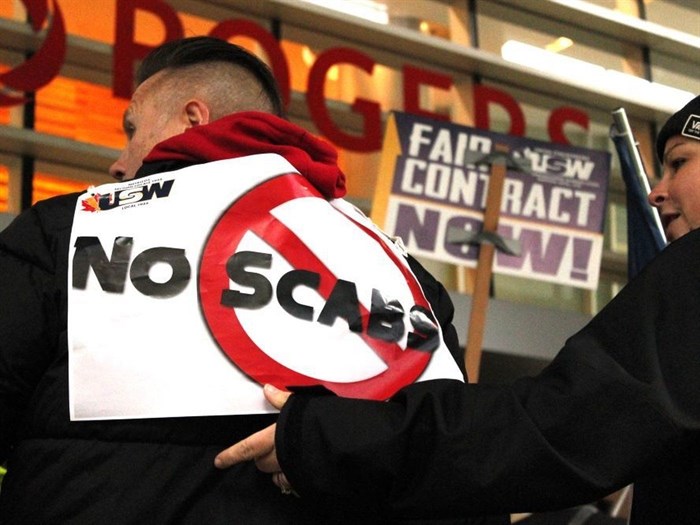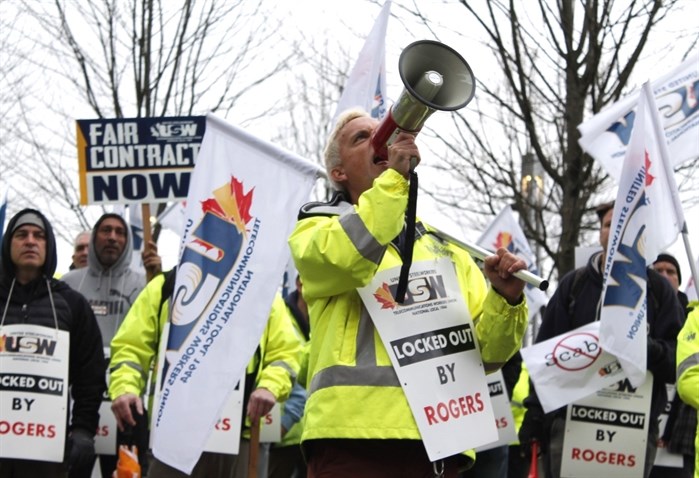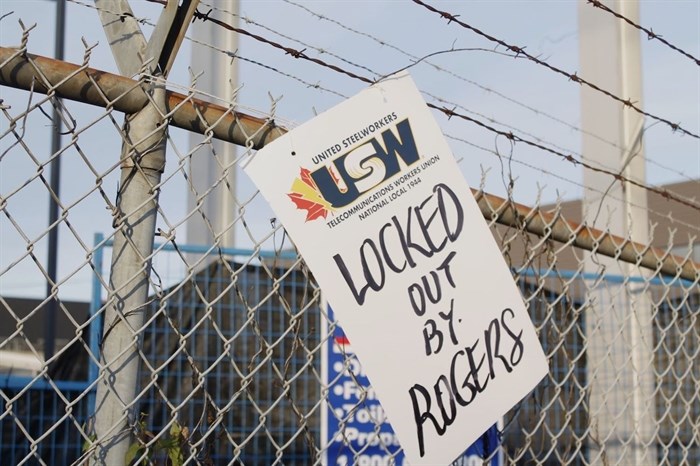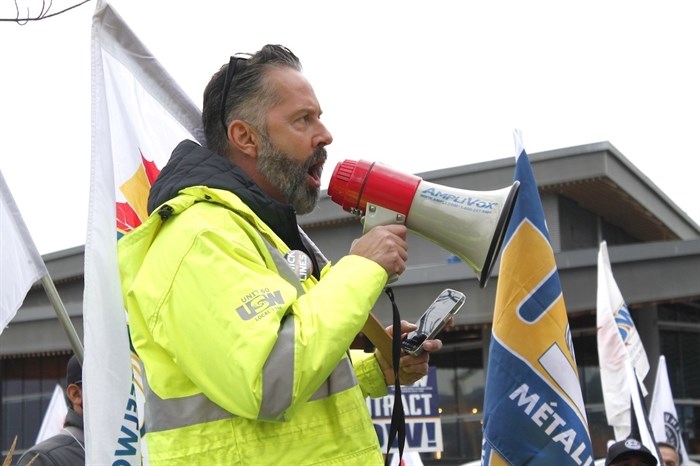
Supporters of the United Steelworkers protest outside Rogers Communications' downtown Vancouver tower.
Image Credit: Zak Vescera, Local Journalism Initiative
November 16, 2023 - 12:03 PM
Raine Wright yells into his megaphone as men in neon yellow jackets circle around a chain-link gate outside an East Vancouver industrial yard.
They’re members of United Steelworkers Local 1944, some of the roughly 300 technicians who have been locked out by telecom giant Rogers after contract talks broke down and the union announced it would launch rotating strikes.
But his workplace is still running, as Rogers has hired dozens of replacement workers to keep up with the work.
The union’s response? Forming human walls to hold up the trucks.
“We’re just going to walk back and forth and let them feel a little bit of pain. This is slowing things down,” said David Makoutz, the strike captain.
But that’s about all they can do.
Unions hope work stoppages will push employers back to the bargaining table because they lose money. Businesses hope union members will return to bargaining because they’re not getting paid.
But replacement workers reduce the effectiveness of a union’s weapon of last resort.
“For us, this is literally the last tool in our tool box to get the company to have a serious conversation with us,” said Makoutz. “The fact that they can bring in scab labour and undermine the last tool we have in our box — it really bothers me. The system is rigged against the worker.”
But soon, that may change.

Raine Wright says striking Rogers workers will do what they can on the picket lines to disrupt operations despite the corporation’s use of replacement workers.
Image Credit: Zak Vescera, Local Journalism Initiative
The Canadian government announced last week it is introducing a ban on replacement workers — pejoratively known as scabs — across federally regulated industries, including mining, fishing, transportation and telecommunications.
B.C. and Quebec already ban replacement workers during strikes or lockouts, and Manitoba is considering similar rules. The arguments for a ban include balancing the relative power of unions and employers and reducing the risk of picket line violence.
The legislation, promised by the Liberals as a condition of NDP support for their minority government, would amend federal labour laws to ban companies in federally regulated industries from hiring employees to do the work of union members during a strike or lockout.
“This is the biggest thing to happen to collective bargaining in this country in, frig, I don’t know how long,” federal Labour Minister Seamus O’Regan said Friday.
But there’s a catch: the bill won’t come into force until 18 months after it passes final reading.
That puts the bill’s implementation within months of the next scheduled federal election, when a new government could scrap it.
Labour unions are now trying to fast-track the bill’s passage, as business groups lobby to stop it entirely.
Larry Savage, a labour studies professor at Brock University in Ontario, said much will depend on how the government responds to employers who argue the bill unfairly undermines their right to operate their businesses.
“For unions, I think this represents a historic step forward,” Savage said. “And it represents the first step forward, because we should expect business lobby to take all steps to kill or water down this bill.”
If you wanted to know how unions feel about replacement workers, you had only to stand at a street corner in Vancouver on Thursday, where locked-out United Steelworkers members marched outside of Rogers’ downtown tower.
USW Local 1944 president Donna Hokiro said replacement workers should “go back to the dirty, disgusting place from which you came.” Andy Wong, a member of the union’s bargaining team, said “they are human — sort of.” He then retracted the statement.
It’s why Savage said federal anti-scab legislation is “one of the most contentious policy issues in Canadian labour law,” especially for the more than 900,000 Canadians who work at banks, railways, aviation companies and other federally regulated workplaces.
Employers, Savage said, insist such laws threaten their property rights and their ability to run a business during a strike or lockout. The Canadian Chamber of Commerce released a statement last week arguing the federal government’s planned legislation “proposes to tilt the scales in favour of labour unions, regardless of the cost to our economy.”
Unions, meanwhile, say the use of replacement workers lets powerful companies lock out workers indefinitely without consequence, forcing them to accept poor contracts to keep their jobs.
“Debates about anti-scab laws are fundamentally debates about power,” Savage said.
That tension is why successive attempts to introduce federal bans on replacement workers have sputtered and failed.
The latest attempt is a condition of a deal between the Liberal party and the NDP to keep the former in power.
It would ban replacement workers at all times, with the exception of a set list of workers needed to protect public safety or the environment if they are at risk.
O’Regan said employers and unions would need to agree who is on that list within 15 days of the bargaining process. If employers hire anyone outside that list, unions can report them to the Canada Industrial Relations Board, a federal labour quasi-judicial body that will be able to fine employers $100,000 for every day they break the law.
O’Regan said taking away the option to hire replacement workers will bring balance to the bargaining process.
“We thought it was balanced just because we were doing it for so long,” O’Regan said. He noted letting employers hire replacement workers creates ill will and takes the focus off finding a deal at the table.
“I arrived at the conclusion that this is like something out of a Charles Dickens novel,” he said.
The law won’t come into effect until 18 months after it passes its final reading in the House of Commons.
But Canadian Labour Congress president Bea Bruske wants it done faster.
“We absolutely want to make sure it doesn’t take a full 18 months to implement this legislation. We think it can be fast-tracked,” Bruske said.
At the current pace, the bill would likely not enter into force until 2025 — an election year.
“We don’t want this to die on the order paper. We don’t want this to die because of an election,” Bruske said.
O’Regan said he, too, would prefer that the bill come into force sooner but said the Canada Industrial Relations Board — the body that will enforce the law — told him it needed that time to hire and train staff to accommodate the new process.
“I would’ve had it done tomorrow,” O’Regan said. “The people who need to referee all of this business told us they need that amount of time,” O’Regan said.
Meanwhile, business groups say the bill should be stopped entirely.
In a statement, Canadian Chamber of Commerce president Perrin Beatty argued O’Regan’s bill would allow striking unions to upend supply chains and would “encourage workplace disruptions.”
Savage, though, said there’s no conclusive evidence that banning replacement workers leads to more strikes.
In Quebec and British Columbia — the two provinces that have banned replacement workers in provincially regulated workplaces — Savage said there is no expert consensus that those laws created “strike-happy unions.”
“No union leader is interested in negotiating employers out of business,” Savage said.
On the other hand, some union leaders argue allowing replacement workers leads to long, drawn-out lockouts and strikes where companies effectively try to starve out workers.
In 2019, a group of telecommunications technicians in the Lower Mainland working for a subsidiary of construction giant Ledcor went on strike. They remained on the picket line for three years.
The Canada Industrial Relations Board eventually found LTS Solutions Ltd. had denied those members of the International Brotherhood of Electrical Workers Local 213 their union bargaining rights over five years of failed negotiations.
Robin Nedila, IBEW 213’s assistant business manager, said sectors like telecommunications have become increasingly consolidated in recent decades — perhaps best epitomized by Rogers’ $26-billion acquisition of Shaw.

Members of the United Steelworkers Local 1944 say were locked out by telecom giant Rogers. The company has since replaced some striking workers with contractors and other staff.
Image Credit: Zak Vescera, Local Journalism Initiative
He argued that has created big companies with the cash to hire or fly in replacement workers instead of compromising on a deal.
“We feel this is a natural correction in the labour code to balance out the power,” Nedila said.
‘No contract, no peace’
Back at the Rogers industrial yard in East Vancouver, the gate snaps shut; no truck came.
Raine Wright yells again into his megaphone: “No contract, no peace.” A pair of security guards look on from inside their car as the workers disperse.
Wright, like almost all the people here, has worked this job for more than a decade, back when it was still Shaw.
Rogers finalized its acquisition of that company earlier this year. But the Shaw sign still stands over the yard. Many of its trucks have not been repainted: some are Rogers’ signature cherry red; others, Shaw’s sky blue.
Whatever their colour, Wright wants to hold them up. The company has erected fences, he said, to block their view of who is in the yard.
“We’re likely going to bring out some drones so we have some aerial footage,” Wright said. The day before, at a separate yard in Surrey, he said, they were able to hold up some trucks for hours.
Jayson Little, a staff representative for USW Local 1944, said the heart of the dispute stems from concessions the company wants that would allow more union work to be done by contracted companies, which they worry will lead to the disappearance of those jobs.

Jayson Little is a staff representative for the United Steelworkers. He said a federal ban on replacement workers levels the playing field between workers and employers.
Image Credit: Zak Vescera, Local Journalism Initiative
In a statement, a Rogers spokesperson confirmed the company “redeployed employees and contractors” to keep things running. The company, though, denies its proposal would lead to an increase in contracting out.
Their last collective agreement expired in January. Earlier this month, union members voted to begin a rotating picket at Rogers’ three yards, which service much of the Lower Mainland.
Instead, the company locked them out. Little said they had identified dozens of people on the job, many of whom they believe are replacement workers flown in from other parts of the country.
Little said the use of replacement workers was “demoralizing” for members. And he said he wasn’t optimistic the company was in any rush to resume negotiations.
“These billion-dollar corporations can just lock people out indefinitely and then [use] scab labour,” Little said.
O’Regan’s bill — if it passes — would not take effect in time to help Little’s union in its dispute. But he said it is overdue.
“For them, this can’t come fast enough.”
— This story was originally published by The Tyee.
News from © iNFOnews, 2023